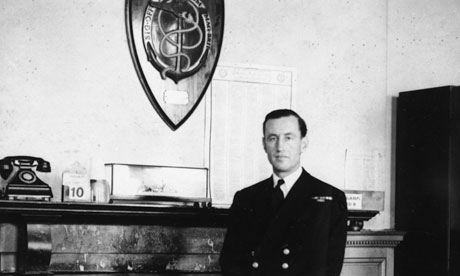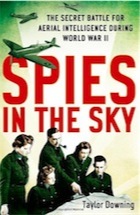Nearly 70 years after it ended, the second world war is still throwing up books inspired by the conflict

Commander Ian Fleming in the Admiralty’s Room 39. Photograph: Sidney Beadell/News International
This week's Remembrance Day is almost superfluous. British writers and readers just can't stop fighting the second world war. It ended nearly 70 years ago, but it's as though the guns have just fallen silent.
 Spies In The Sky: The Secret Battle for Aerial Intelligence during World War II
Spies In The Sky: The Secret Battle for Aerial Intelligence during World War II
There are several strands to the British book trade's preoccupation with this war. First, there's the appalling fascination of the Nazis, who remain a literary and artistic obsession. This was satirised by the late Alan Coren in Golfing for Cats, a slim volume of comic pieces adorned with a lurid swastika. After golf and cats, said Coren, the Third Reich was one subject that never failed to exhilarate the British book buyer.
There's also a treasure trove of incredible stories, narrative bullion, locked up in the years 1939-45. As the Great War fades from living memory and becomes part of history, its successor takes its place. The conflicts of 1914-18 were largely European. A genuinely global struggle, the second world war satisfies an international appetite for war stories, some of them now coming to light for the first time.
Finally, where the "war to end all wars" was a traditional great power slugfest, the contemplation of the second world war allows the British reader to occupy the moral high ground. Churchill's instinct to fight Hitler to the death was belligerent, but morally right. Britain's sacrifice was indeed our "finest hour". Internationally, we have traded on it ever since.
In the aftermath of 1945, there have been at least three phases of literary response and each one of them has been pure box office. At first, the celebration of the stiff upper lip insisted that the war should be remembered for its Boy's Own adventures in books such as Ill Met By Moonlight, The Man Who Never Was and Appointment with Venus. These postwar bestsellers were interspersed with grittier exploits such as The Dam Busters and The Wooden Horse.
When the appetite for these entertainments ran out, there were two decades of memoirs and biographies recycling the myth of the conflict. Now, for the first time, the true story of the camps began to be told, though the full horror of the Holocaust was not popularised in book form until the late 60s.
Rest of McCrum's piece here.
 Spies In The Sky: The Secret Battle for Aerial Intelligence during World War II
Spies In The Sky: The Secret Battle for Aerial Intelligence during World War IIThere are several strands to the British book trade's preoccupation with this war. First, there's the appalling fascination of the Nazis, who remain a literary and artistic obsession. This was satirised by the late Alan Coren in Golfing for Cats, a slim volume of comic pieces adorned with a lurid swastika. After golf and cats, said Coren, the Third Reich was one subject that never failed to exhilarate the British book buyer.
There's also a treasure trove of incredible stories, narrative bullion, locked up in the years 1939-45. As the Great War fades from living memory and becomes part of history, its successor takes its place. The conflicts of 1914-18 were largely European. A genuinely global struggle, the second world war satisfies an international appetite for war stories, some of them now coming to light for the first time.
Finally, where the "war to end all wars" was a traditional great power slugfest, the contemplation of the second world war allows the British reader to occupy the moral high ground. Churchill's instinct to fight Hitler to the death was belligerent, but morally right. Britain's sacrifice was indeed our "finest hour". Internationally, we have traded on it ever since.
In the aftermath of 1945, there have been at least three phases of literary response and each one of them has been pure box office. At first, the celebration of the stiff upper lip insisted that the war should be remembered for its Boy's Own adventures in books such as Ill Met By Moonlight, The Man Who Never Was and Appointment with Venus. These postwar bestsellers were interspersed with grittier exploits such as The Dam Busters and The Wooden Horse.
When the appetite for these entertainments ran out, there were two decades of memoirs and biographies recycling the myth of the conflict. Now, for the first time, the true story of the camps began to be told, though the full horror of the Holocaust was not popularised in book form until the late 60s.
Rest of McCrum's piece here.
No comments:
Post a Comment